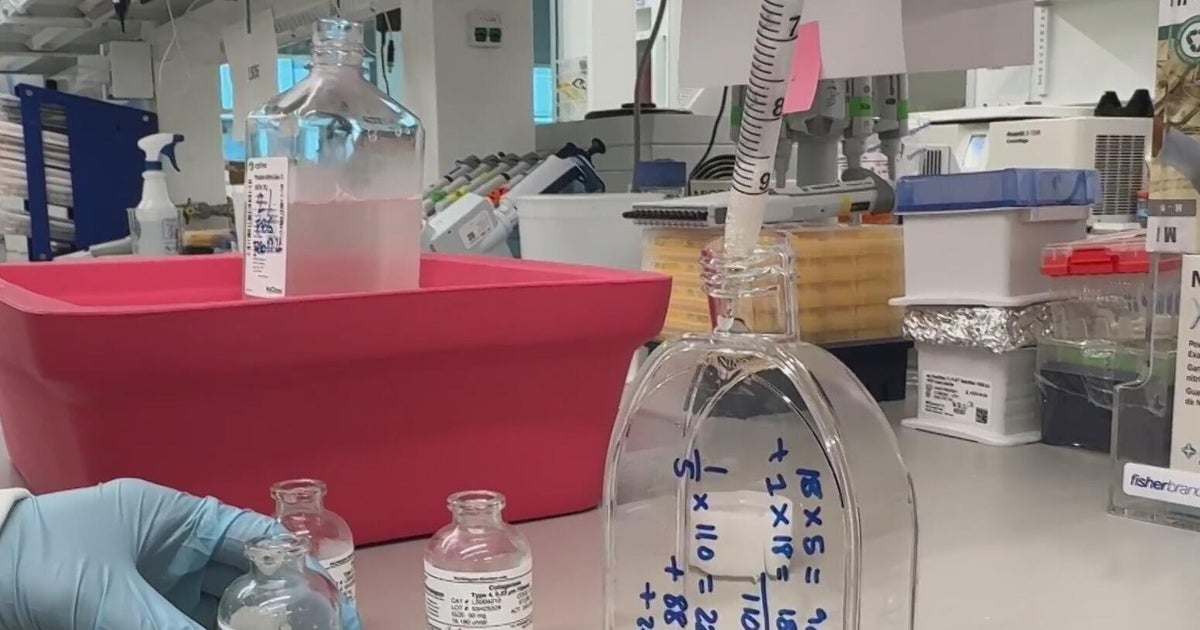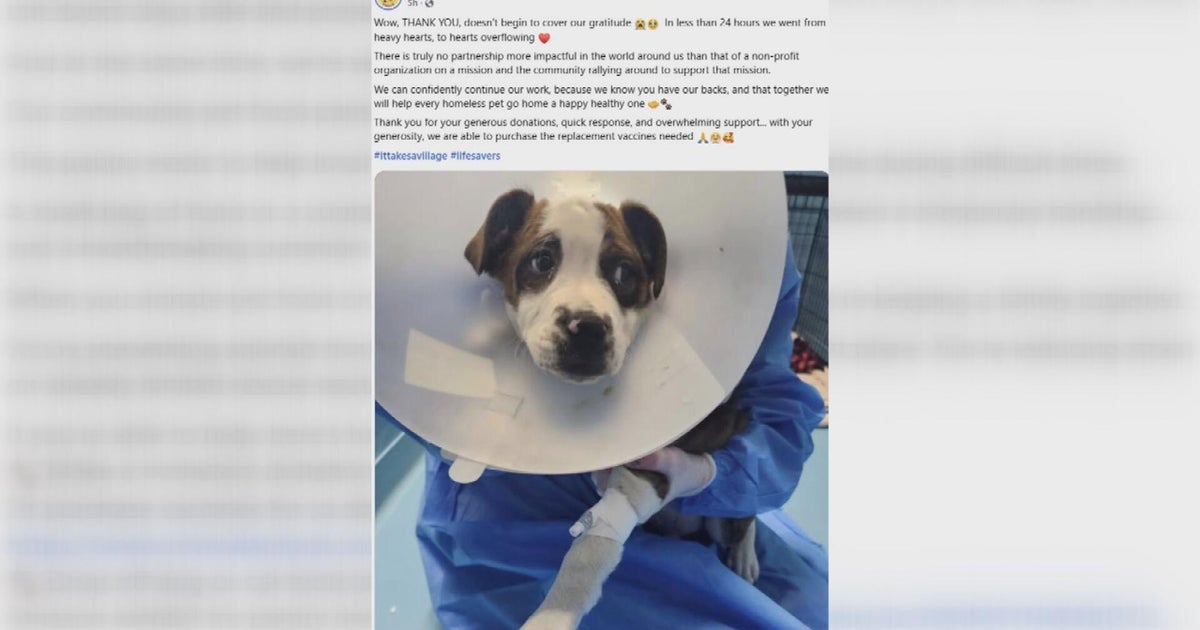Expert sees "nothing sinister" amid questions over Oxford vaccine trial data
London - AstraZeneca and Oxford University on Wednesday acknowledged a manufacturing error that raised questions about preliminary results of their experimental COVID-19 vaccine, but one outside expert told CBS News there's "nothing sinister" in the way human trial data was gathered, and he remains optimistic that the vaccine will be deemed safe and effective and approved for use.
A statement describing the error came days after the company and the university described the shots as "highly effective" and made no mention of why some study participants didn't receive as much vaccine in the first of two shots as expected.
The group of volunteers that got a lower dose seemed to be much better protected than the volunteers who got two full doses. In the low-dose group, AstraZeneca said, the vaccine appeared to be 90% effective. In the group that got two full doses, the vaccine appeared to be 62% effective.
Combined, the drugmakers said the vaccine appeared to be 70% effective, but the way in which the results were arrived at and reported led to questions from some experts.
The partial results announced Monday are from large, ongoing studies in the U.K. and Brazil designed to determine the optimal dose of vaccine, as well as examine safety and effectiveness. Multiple combinations and doses were tried in the volunteers. They were compared to others who were given a meningitis vaccine or a saline shot.
Was it a mistake?
Before they begin their research, scientists spell out all the steps they are taking and how they will analyze the results. Any deviation from that protocol can put the results in question.
In a statement to CBS News on Thursday, Oxford University said the dosing in all of the three trial stages was meant to be the same, but "as a result of a difference in the manufacturing process" for the phase-3 trial, the largest by far, the methods used to measure the concentration of vaccine in the vials overestimated the dose in newer batches, "resulting in a half dose of the vaccine being administered as the first dose."
The university said that it discussed the problem with British drug regulators and agreed to complete the late stage trial with the two separate sub-groups.
Oxford said in its statement that its methods for measuring vaccine concentration had been adjusted to avoid any further discrepancies, "and we can ensure that all batches of vaccine are now equivalent." On Thursday, AstraZeneca CEO Pascal Soriot told Bloomberg News that the company needs to conduct a new trial, but he suggested it could be conducted quickly because the vaccine's high efficacy meant the new trial would need a smaller number of patients.
What about the results?
Some experts say the relatively small number of people in the lower-dose sub-group — 2,741 people — makes it difficult to know whether the 90% efficacy seen in that group is real or a statistical quirk. A total of 8,895 people received two full doses, and in that group the efficacy was lower at about 60%.
Another factor: none of the people in the low-dose group were over 55 years old. Younger people tend to mount a stronger immune response than older people, so it could be that the youth of the participants in the low-dose group made it look more effective, rather than the size of the first dose.
Earlier this month, a peer-reviewed analysis of Oxford's Phase 2 trial data, published in The Lancet, found that the vaccine "has similar immunogenicity across all age groups" after two full doses, and that it was in fact "better tolerated in older adults than in younger adults."
That phase of the trial involved 560 adults, including 240 people over the age of 70.
Older patients are known to be at significantly higher risk of severe disease and death with the coronavirus — they're the patients most likely to fill over-stretched ICU hospital wards, and they've been earmarked to receive the vaccine first.
Why might a smaller dose work better?
Oxford researchers say they aren't certain and they're working to uncover the reason, but they have some ideas.
Sarah Gilbert, one of the Oxford scientists leading the research, said the answer is probably related to providing exactly the right amount of vaccine to trigger the best immune response.
"It's the Goldilocks amount that you want, I think, not too little and not too much. Too much could give you a poor quality response as well,'' she said. "So you want just the right amount and it's a bit hit and miss when you're trying to go quickly to get that perfect first time."
Professor Adrian Hill, the director of Oxford's Jenner Institute, which developed the vaccine, explained this "Goldilocks" theory in more detail to CBS News' Charlie D'Agata, saying that giving a first dose of the vaccine provokes an immune response to both the coronavirus antigen, which is what protects someone from infection, and to the virus itself.
"If you give a large dose first and a large dose second, when you come along with the second, it doesn't work as well because there's some immunity that you caused by giving the first dose," he said. "By dropping the size of the first dose, halving it, you very likely impede that antivector immunity, as we call it, so the second dose works better."
Hill stressed that this explanation had not yet been proven, "but that's something we'll be looking at over the next weeks and months."
Where do we go from here?
Moncef Slaoui, who leads the U.S. coronavirus vaccine program Operation Warp Speed, said Tuesday in a call with reporters that U.S. officials are trying to determine what immune response the vaccine produced, and may decide to modify the AstraZeneca study in the U.S. to include a half dose sub-group.
"There are number of variables we need to understand," Slaoui said, adding that "we want it to be based on data and science."
Full details of the trial results will be published in medical journals and provided to U.K. regulators so they can decide whether to authorize distribution of the vaccine.
Those reports will include a detailed breakdown that includes demographic and other information about who got sick in each group and give a more complete picture of how effective the vaccine is.
"Nothing sinister"
While even AstraZeneca and Oxford would admit that more data analysis is still needed to determine, conclusively, how well their vaccine works and what dosage should be used, Danny Altmann, a professor of immunology at Imperial College London, told CBS News on Thursday that he's not overly concerned by the error behind the trial data.
"There's nothing sinister or unsafe or that undermines the veracity of their work," said Altmann, who has no connection to the Oxford vaccine, and is equally optimistic about it and the other main vaccine candidates in late-stage trials, from Pfizer and Moderna, for instance.
Rather than an attempt to misrepresent trial data, Altmann attributes the Oxford team's characterization of their preliminary success — and the scrutiny of it — to the unprecedented speed of the vaccine development process amid this pandemic, and the unprecedented public interest in it.
"It really shines a very harsh spotlight on the foibles and pitfalls of 'science by press release,' which is something that everyone has almost been frogmarched into by circumstance in the current climate," he told CBS News.
He said the preliminary medical trial data that the world has been so keen to devour and understand would normally be judged on a lengthy manuscript for peer review.
"We're not used to assessing data in real time by short press release," he said. Asked if the reasons for and details of the half-dose regimen should have been disclosed in full in the press release Oxford sent on Monday, he said: "It's the price we pay for a simplified soundbite process."
And most importantly, based on the data available, Altmann remains hopeful not only that the Oxford vaccine will pan out, but that it won't be alone.
"My assumption is that within a month we would have seen really strong, large peer-reviewed data-sets, probably from Pfizer and Moderna and Oxford, and I suspect Novavax as well," he said. "Then we'll have to go through them with a fine-tooth comb. I suspect they'll all be very good. I suspect they'll all be in the right ballpark. I think they'll all be capable of saving our bacon."



